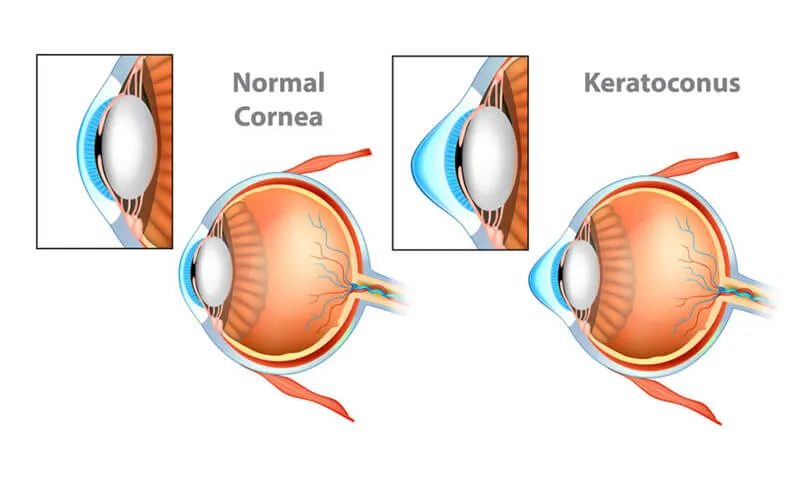Keratoconus
What Is Keratoconus?
Keratoconus is a condition that affects the cornea — the transparent, dome-shaped portion at the front of the eye. This condition causes the standard aspheric shape of the cornea to be distorted and develop into a cone-like bulge. As keratoconus progresses, the cornea will bow and thin, becoming irregular and sometimes forming scars. While this is a progressive disease, it is generally slow and can stop at any stage, ranging from mild to severe. Keratoconus topography helps with diagnosing this disease.

What Causes Keratoconus?
Doctors have not identified an apparent reason why keratoconus develops, although it is associated with eye allergies and excessive rubbing of the eyes. The condition shows signs of being genetic, with one out of 10 patients having a parent who has had it. People with keratoconus typically develop it in their late teens or early 20s, with symptoms slowly worsening over the next 10 to 20 years. Various factors are known to increase one’s chances of developing this ocular disease. These risk factors include having a family history of keratoconus, rubbing your eyes vigorously, and having certain conditions, such as retinitis pigmentosa, Down syndrome, Ehlers-Danlos syndrome, hay fever, and asthma. Reach out today to learn more about keratoconus causes.
The Symptoms of Keratoconus
Keratoconus often affects both eyes, but the impact on each eye can vary. The signs and symptoms of this ocular disease can also change as the disease progresses. Keratoconus symptoms include, but are not limited to, the following:
- Blurred Vision
- Distorted Vision
- Sensitivity to Light
- Redness or Swelling
- Nearsightedness
- Astigmatism
- Inability to Wear Contacts
- Frequent Change in Vision
- Clouding of Vision
We Offer Keratoconus Treatment Options
Keratoconus can be diagnosed with a standard eye exam that involves your ophthalmologist examining the cornea and possibly measuring its curve. Mild cases of keratoconus can be treated early with eyeglasses to correct vision impairment or sometimes keratoconus contact lenses. While contact lenses often significantly improve vision, wearing them is not a cure for keratoconus, nor do they alter the course of the disease. Great care and expertise must be used to fit contact lenses for keratoconus. Frequent check-ups and lens changes may be necessary due to subtle and unpredictable changes in the shape of the cornea. Other treatments include:
Contact Us Today for Keratoconus Treatment
Keratoconus impacts everyone differently, and treatments depend on the condition’s severity. If you or a loved one is dealing with keratoconus, the team of leading ophthalmologists at Dean McGee Eye Institute can help. With decades of experience, you can trust our professionals to provide premier care in a comfortable environment. Schedule an appointment today.
Keratoconus Treatment at Dean McGee Eye Institute
Keratoconus impacts everyone differently, and treatments are dependent on the severity of the condition. If you or a loved one is dealing with keratoconus, the team of leading ophthalmologists at Dean McGee Eye Institute can help! Call 405.271.1095 or 800.787.9017 to schedule your appointment today.
